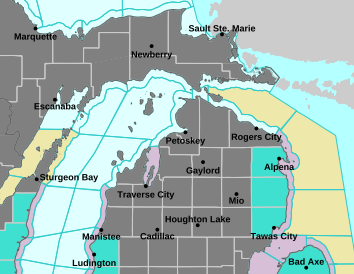Poor air quality alert in effect through weekend
Local medical officials urge caution

Image provided by National Weather Service Counties highlighted in gray are under air quality alerts.
ALPENA — Wildfires in the provinces of Manitoba and Saskatchewan in Canada have been affecting the air quality in Northeast Michigan and causing increased health complications for some.
Patrick Bak, meteorologist at the National Weather Service in Gaylord, said that the smoke is blowing in from Canada due to wind coming from the northwest. For the smoke to go away, we would need a change in wind direction, he said.
There has also been a temperature inversion, where a layer of warm air sits on a layer of cool air and keeps smoke and other pollutants close to the ground.
The wind direction is expected to keep blowing from the northwest through the weekend, but the direction could change next week with other variables, Bak said.
When the smoke is closer to the ground, it may smell like a campfire outside due to the scent of burning wood from the wildfires. The smoke may also affect visibility and create a haze, Bak said.
With smoke likely to linger through the weekend, local medical officials want to make people aware of the effects the smoke could have on their health.
“For individuals with lung diseases such as asthma or Chronic Obstructive Pulmonary Disease (COPD), exposure to air labeled as ‘very unhealthy’ can pose immediate challenges,” Paul Berg, M.D., M.H.A., chief medical officer and senior vice president at MyMichigan Health, said in a press release on Thursday. “Breathing this polluted air can trigger breathing difficulties and aggravate existing symptoms, making disease management more challenging.”
Even individuals without pre-existing health conditions may experience adverse effects from “very unhealthy” air quality. Healthy people can develop breathing issues, while those with heart conditions may face increased risks of heart attacks or strokes. Vulnerable groups, including children and adolescents, may also suffer from impaired lung development. In severe pollution scenarios, relocating temporarily might be advisable for high-risk individuals to mitigate health risks, the press release stated.
To safeguard health during periods of poor air quality, MyMichigan Health reminds individuals to stay indoors whenever possible and limit outdoor activities. When outdoor exposure is unavoidable, wearing protective masks such as N95 can reduce inhalation of harmful pollutants. Utilizing air conditioning and air purifiers at home can further reduce indoor pollution levels. Additionally, using the air recirculator in vehicles and central air systems at home can help maintain safer air quality indoors.
Certain populations, including pregnant women, children, the elderly, and those with pre-existing health conditions, should exercise additional caution during poor air quality events. Monitoring these individuals closely and minimizing their exposure to polluted air is crucial. While short-term exposure may not severely impact healthy individuals, adhering to protective measures remains a wise precaution.
Be sure to seek medical attention immediately if you are experiencing significant respiratory difficulties, chest pain or tightness, wheezing, or deterioration of existing respiratory conditions.
Reagan Voetberg can be reached at 989-358-5683 or rvoetberg@TheAlpenaNews.com.


